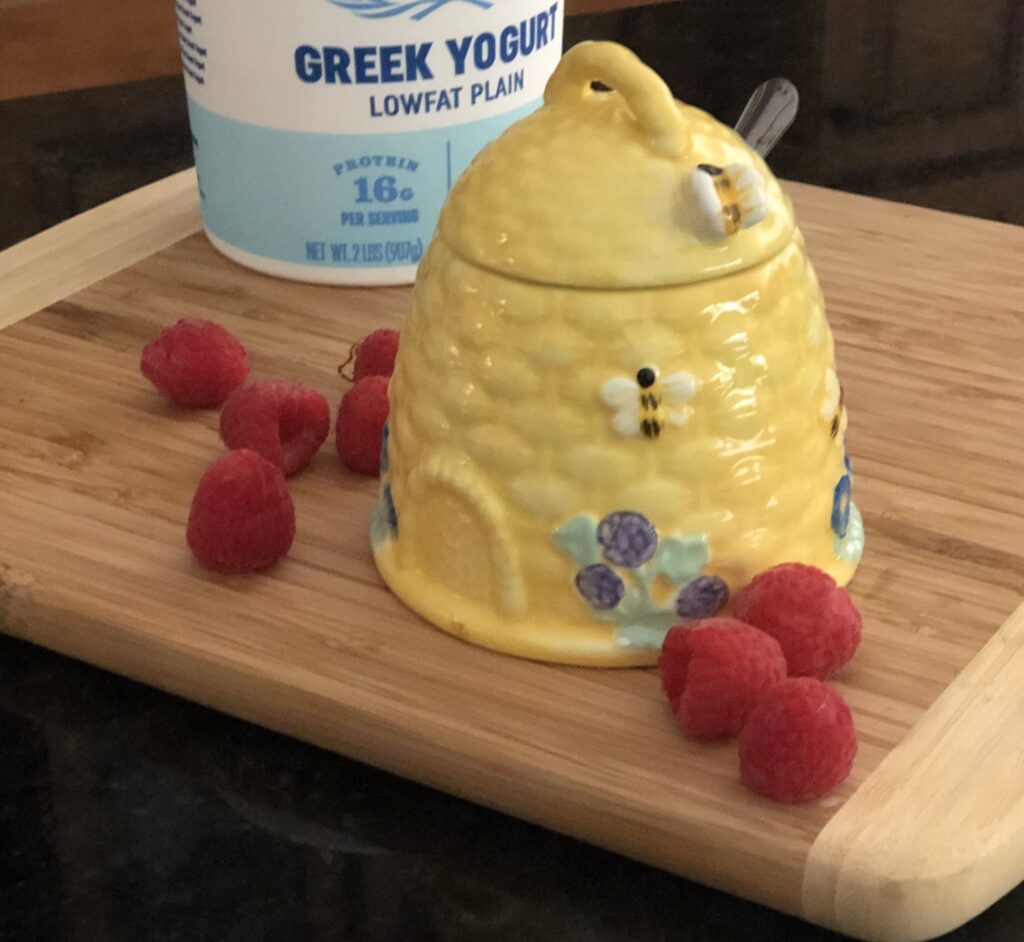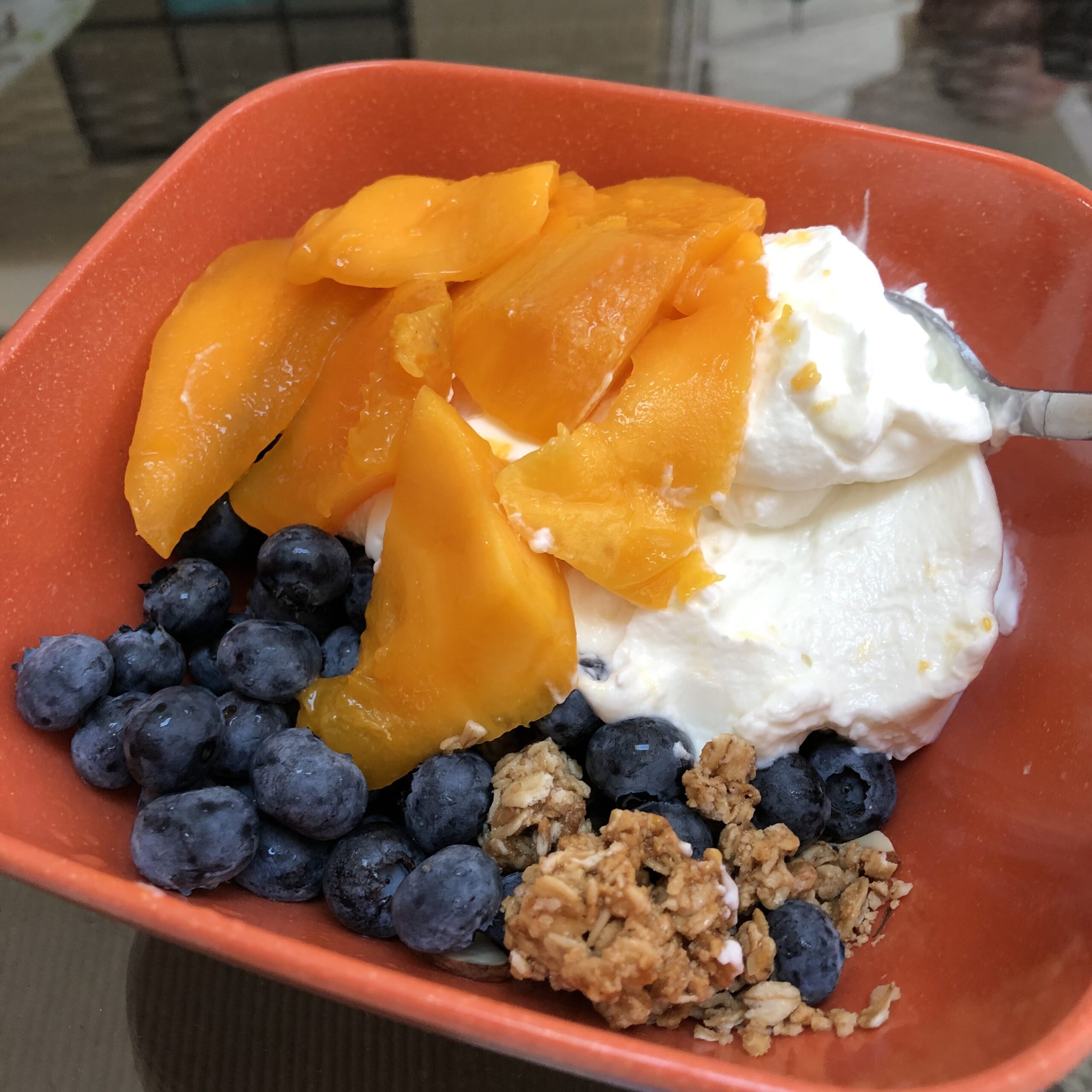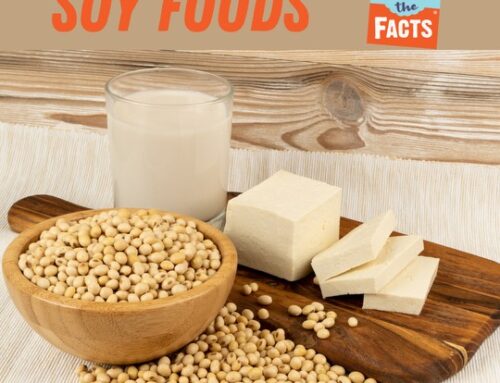If you enjoy yogurt, there’s a good chance you may have switched to Greek yogurt over the past few years.
Greek yogurt has taken up more space in the yogurt section of the grocery store of late. It’s a great substitute for full fat sour cream and makes a healthy high protein snack. It’s thicker and higher in protein because it’s strained. The straining process removes some of the calcium, however it’s still a good source of calcium.
Yogurt is made by fermenting milk with active cultures. These active cultures and fermentation helps with digestion, and the cultures actually help break down the naturally occurring milk sugar (lactose). For anyone who is lactose intolerant, you may find that, unlike milk, you can tolerate yogurt (regular or Greek, although Greek is even lower in lactose). It’s also a great addition to a DASH meal plan.
Gazing at all of the Yogurt choices at the grocery store however can be a little mind-boggling – there’s fruited, blended, Light versions, low-fat, nonfat and whole milk yogurts. There are regular blended varieties and Greek styles. The best choices overall are those lower in sugar, but for everyday use and for cooking, I recommend plain nonfat or plain low fat Greek yogurt. If weight management is of concern, choosing a nonfat or low fat Greek yogurt is your best bet.
Calories aside, the whole milk variety is fine. It’s higher in saturated fat, but some studies suggest that dairy fat may not have a negative impact on heart disease like other animal fats do. However choosing the lower fat products may help support your weight management goals.
Nutrition
High in protein and a good source of calcium and potassium, Greek yogurt fits into a healthy lifestyle.
It’s a good idea to compare the added sugars across brands in fruit or flavored yogurt. “Light” versions usually have a nonnutritive sweetener added, that provides sweetness without calories. The best strategy is to add your own fruit to plain yogurt most of the time. A drizzle of honey over plain yogurt provides enough sweetness with much less added sugar than most packaged flavored yogurts. Top it with sliced banana or fresh or frozen berries, and it’s delicious.

3/4 cup of this 2% Greek yogurt provides 16 grams of protein. Up the portion to 1 cup to get 22 grams.
Protein
Higher in protein than regular yogurt, Greek yogurt is a great protein value per 100 calorie portion. Protein helps maintain and build muscle. For your daily protein consumption to be the most efficient, it’s a good idea to include about 20 grams at each meal. A cup of Greek yogurt provides a great protein option at breakfast or as a mid-day snack, when some folks have a more difficult time finding enough protein. It’s helpful for weight control too because protein helps keep you full longer. One cup of nonfat Greek yogurt provides 20-25 grams of protein and only 120 calories, depending on the brand and fat content.
Calcium
Calcium supports bone health but also muscles and blood vessels. 1 cup of plain Greek yogurt provides about 30 percent of your daily calcium.
Potassium
Potassium helps control blood pressure. Greek yogurt is lower in potassium than regular yogurt but nonetheless does supply some potassium. One cup provides about 8 percent of your potassium needs versus the 12 percent supplied by regular yogurt.
Incorporating Plain Greek Yogurt into the Kitchen
Essentially you can sub in Greek yogurt anywhere you used sour cream. In addition it can be a delicious snack or be used in cooking to create creamier dishes.
- Spoon it into a breakfast bowl.
- Dip it and roll it. Make banana pops by inserting a popsicle stick into half a banana. Dip the banana into plain greek yogurt, then roll it into crushed cereal or granola.
- Mix it. Use it in tuna or egg salad, as a substitute for half the mayonnaise
- Top it. Add a dollop onto a bowl of chili or use a topping for tacos.
- Blend it. Yogurt adds body and protein to fruit smoothies. Simply add 1/2 cup of yogurt with 1 cup of fruit to your smoothie maker and blend.
DASH Diet Greek Yogurt Bowl
Ingredients
- 3/4 cup Low-fat Greek yogurt
- 1/2 cup sliced mango
- 1/2 cup blueberries
- 1/4 cup flax seed granola
- 1 tsp honey
Instructions
- Spoon yogurt into bowl.
- Top with fruit. Add granola.
- Drizzle with honey and enjoy.





